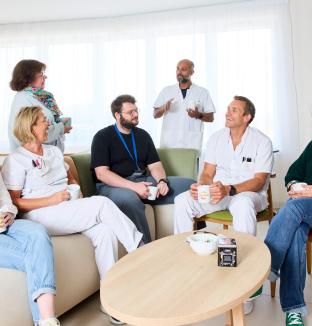From shock to rehabilitation: understanding the post-accident process
At emeis, post-accident rehabilitation is more than just isolated physiotherapy sessions. It's a multidisciplinary care pathway that combines medical expertise, human support and team coordination. The aim is to enable each patient to regain maximum independence under the best possible conditions.
Admission chosen according to patients' therapeutic needs
Everything starts well before the patient arrives at the rehabilitation centre. A multidisciplinary committee meets twice a day. It is made up of a coordinating doctor and the care and rehabilitation manager. Together, they examine all the files submitted by the region's hospitals to direct patients to the establishment best suited to their needs.
"This system guarantees optimum responsiveness and a precise match between patients' needs and the expertise available," emphasises Cynthia Van As, rehabilitation coordinator in Provence and emeis regional referral manager.

An efficient welcome from the first hours of admission
From the moment you arrive at one of the Group's facilities, everything is meticulously orchestrated. A precise protocol is put in place, successively mobilising four key professionals:
- The nurse assesses daily autonomy: toileting, eating and mobility;
- The doctor reviews the medical file and prescribes the necessary treatment;
- The physiotherapist identifies mobility priorities to develop a coherent care plan and ensures that the patient has the necessary and appropriate technical mobility aids;
- The occupational therapist adapts the patient's environment in their room, depending on their physical restrictions (fractures, postural restrictions, etc.).
"The idea is to make the environment safe, anticipate needs and start rehabilitation from the very first hours," explains Cynthia Van As.
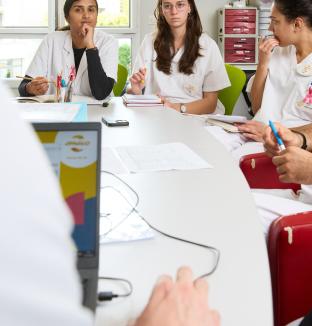
Tailor-made, multidisciplinary care
From the day after a patient's arrival, the rehabilitation sessions prescribed by the doctor in charge begin: physiotherapists, occupational therapists, social workers, dieticians, speech therapists, psychologists and/or neuropsychologists, adapted physical activity (APA) teachers, etc. Each member of staff draws up a personalised care plan, in line with the patient's medical prescriptions, expectations and abilities. Depending on their profile and physical capacity, patients benefit from two to six rehabilitation sessions a day.
A multidisciplinary meeting is held at the end of the first week to align care objectives. "What the physiotherapist improves in terms of mobility, the occupational therapist can transform into daily autonomy. Everything is connected," explains Cynthia Van As.
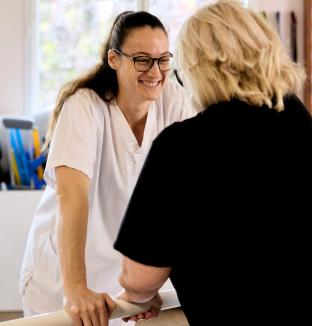
Caring for the body, but also giving patients a new lease of life
In addition to physical rehabilitation, psychological reconstruction is one of the pillars of the programme. The teams include activities linked to the patient's job or interests: "Personalising means creating motivation. And motivation is the driving force behind progress," insists Cynthia.
Group activities are also encouraged: games, workshops and friendly competitions help patients rediscover their zest for life: "Rehabilitation is as much about the physical as the psychological. We organise fun group activities adapted to patients' needs, such as pétanque or Nordic walking, to give them the motivation and desire to progress in their rehabilitation," she explains.
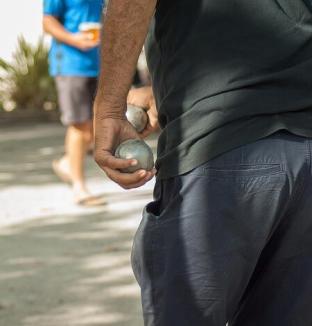
Measuring progress for better progress
Standardised analytical and functional assessment tools are used to objectivise progress, through mobility, walking and balance tests. Data from robotic devices or monitoring software is shared with patients, to encourage and stimulate them: "When we measure their progress objectively, these results are an enormous lever for strengthening their commitment".
Among the many patients Cynthia has cared for during her career, the case of a patient in her forties illustrates the effectiveness of the emeis teams. A victim of a ruptured aneurysm, in an altered state of consciousness with no prospect of improvement, she was transferred from a hospital to one of the emeis rehabilitation centres. Her family had given up hope of anything happening. However, thanks to a multi-disciplinary effort and several months of intensive rehabilitation, this patient was able to speak again, stand upright and participate in her bed-wheelchair transfers, and she was able to rebuild links with her family and friends: "It was the richness and effectiveness of our combined expertise that made the difference. The whole team believed in her potential and worked tirelessly with her to help her progress. The results are spectacular," says Cynthia.
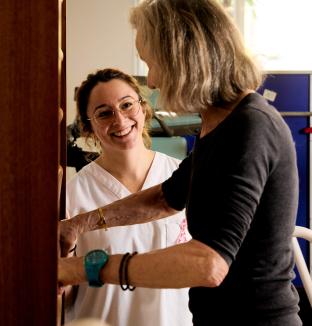
Specialist clinics and carers in continuous training
Thanks to a catalogue of ongoing training courses available to all teams, emeis is also focusing on skills development: "We are lucky to be able to continue training with the support of our employer. And that makes all the difference. It's what enables us to keep up with the complexity of our cases," concludes Cynthia Van as.
Each emeis establishment has specific authorisations issued by the French Authorities (orthopaedics, stroke, cardio-respiratory pathologies, etc.). The right choice of establishment is therefore strategic if you want to benefit from care that is best suited to your patients' needs, provided by experienced professionals.
It's all about complementary expertise, teamwork and personalised support!
